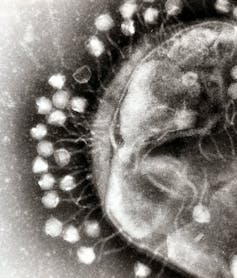Max Planck researcher honoured for groundbreaking research
This year’s Heinrich Wieland Prize is awarded to immunologist Thomas Boehm from the Max Planck Institute for Immunobiology and Epigenetics in Freiburg. With this internationally renowned research prize, endowed with 100,000 euros, the Boehringer Ingelheim Foundation recognizes Boehm’s pioneering contributions to our current understanding of the development and evolution of the immune system in vertebrates.
Thomas Boehm, 2021 Heinrich Wieland Laureate
© MPI of Immunobiology and Epigenetics
The outstanding scientific work of immunologist Thomas Boehm is being honored once again. He is recognized by the Boehringer Ingelheim Foundation for his pioneering contributions to our understanding of the immune system. His research focuses primarily on the development and function of the thymus and T cells as well as the evolution of adaptive immunity.
Using an impressive spectrum of model organisms, he discovered general design principles of cellular immunity in vertebrates, shifting existing paradigms, and offering entirely new perspectives on adaptive immunity.
He identified the transcription factor Foxn1 as an evolutionarily conserved master regulator of epithelial cell differentiation in the thymus. In the thymus, haematopoietic progenitor cells arriving from the bone marrow develop into T cells, which are equipped with all the necessary facilities to fight off pathogens. Boehm was able to show that Foxn1 is necessary for the development of the thymus and thus for immunity in vertebrates. “With this finding from Thomas Boehm, it was possible for the first time to genetically study how T cells develop instead of just describing it. This advance from a then early career researcher had a significant impact on the field of immunology”, says F.-Ulrich Hartl, chair of the Wieland Prize selection committee.
Design principles of adaptive immunity revealed
In studies dedicated to the evolution of the thymus, he also discovered the long-sought thymus equivalent in jawless vertebrates, resolving a century-old debate about the nature of the immune system in this vertebrate lineage. Using comparative studies of phylogenetically diverse model organisms ranging from lampreys to sharks to mice and humans, he reconstructed the evolutionary trajectory of the genetic networks controlling T cell development and recapitulated their step-wise development in vivo. Thus, he was able to identify common design features of the immune systems of all vertebrates and the fundamentals of their adaptability.
Thomas Boehm also discovered an olfactory mechanism by which animals as different as fish and mammals evaluate the composition of major histocompatibility complex (MHC) molecules. All cells of the body are equipped with MHC molecules on their surface. They differ from individual to individual and serve in a sense as identification cards, because they help the immune system to distinguish self from non-self. Thomas Boehm showed that MHC peptides not only assist decision-making in the immune system, but also signal genetic relatedness during mate selection, helping to explain why vertebrates are capable of maintaining a diverse repertoire of MHC genes.
Paradigm shifts in evolutionary immunology
Most recently, Thomas Boehm uncovered that deep-sea anglerfishes have switched off-key players of their adaptive immunity, such as the RAG genes, which orchestrate antigen receptor assembly. Switching off adaptive immunity was previously considered to be highly unlikely, as innate and adaptive immune systems were thought to have become inextricably intertwined over vertebrate evolution. The immunogenetic adaptation in these species enables males to permanently fuse with their much larger female partners, a form of tissue chimaerism that is otherwise unknown in nature. These results demonstrate that co-evolution of innate and adaptive immunity can come to an abrupt end, breaking a central paradigm of evolutionary immunology. However, the findings also indicate that new forms of innate immunity can evolve to protect vertebrates from infection, potentially relevant for a better understanding of organ transplantation.
The award ceremony will take place on 21 October, following a scientific symposium organized by the Boehringer Ingelheim Foundation. At the event, which will be held in English at Schloss Nymphenburg in Munich, the prize winner of 2020, Professor Craig M. Crews from Yale University in the United States, will be presented the award as well.
The Wieland Prize winner at Berlin Science Week
As a special highlight, 2021 Wieland Laureate Thomas Boehm will take part in a digital panel discussion addressing the wider public. The event takes place online on 2 November from 4-5 pm CET as part of Berlin Science Week. This event will be in German and includes a discussion between Thomas Boehm and renowned philosopher Professor Markus Gabriel of the University of Bonn, Germany, about human vulnerability in the context of disease and society.







